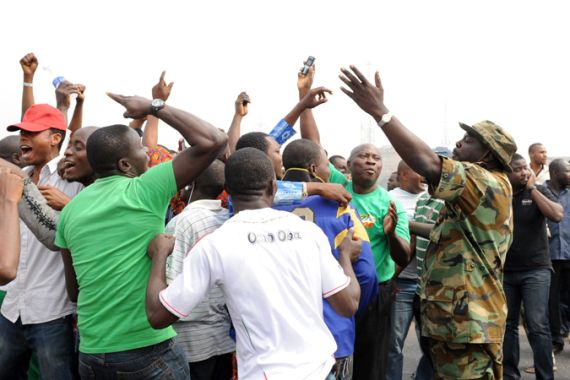Nigerian unions call off national strike
Decision comes after President Jonathan said he would bring down fuel price hikes that have sparked protests.

Union leaders in Nigeria have called off a week-long nationwide strike that has been paralysing the country’s economy, following a decision by President Goodluck Jonathan to roll back fuel-price increases.
Jonathan announced on Monday that he would reduce fuel prices in response to protests and strikes that sprang up after his government withdrew fuel subsidies at the beginning of January.
But his announcement failed to quell all of the protests, and soldiers reportedly used force to shut down demonstrations in Lagos, the country’s commercial capital.
Under Goodluck’s new plan, the Nigerian government will reduce fuel prices by 30 per cent, to around $2.75 per gallon, by restoring some of the subsidies. That price is still considerably higher than the roughly $1.70 per gallon Nigerians paid before the subsidies were removed.
Tear gas in Lagos
The strike cancellation came after an announcement by the unions, early on Monday morning, that they would halt street protests.
The unions feared that “people outside organised labour may try to hijack” the demonstrations, said Abdulwahed Omar, the head of Nigeria Labour Congress.
Still, security forces opened fire into the air and used tear gas on Monday to disperse protesters who came out in Lagos.
An AFP news agency correspondent said soldiers first shot into the air to disperse the protesters before police fired tear gas, forcing them to flee. No injuries were reported.
‘Protests hijacked’
Though the subsidy reductions prompted immediate public anger, the government’s supporters argue the move was necessary.
Jide Olateju, a former adviser to the Nigerian finance minister, told Al Jazeera that the problem was poor communication between the government and the people, not the policy.
“The policy is inherently good for the economy and the people,” he said. “Nigeria imports more than 90 per cent of its refined product and this happens because there was a crippling of its refineries.”
The subsidy system encourages corruption, since importers earn 70 cents per litre and inflate the amount they are importing, Olateju said.
“Once you remove subsidies, there’s an incentive for investors to come in … and refine oil on Nigerian soil,” he said.
Jonathan warns of “anarchy”
In an address on national television on Sunday, Jonathan said provocateurs had hijacked the protests and demonstrations, in which tens of thousands of people marched in cities across the nation.
“It has become clear to government and all well-meaning Nigerians that other interests beyond the implementation of the deregulation policy have hijacked the protest,” he said.
“This has prevented an objective assessment and consideration of all the contending issues for which dialogue was initiated by government. These same interests seek to promote discord, anarchy, and insecurity to the detriment of public peace.”
The nationwide unrest had brought much of Nigeria, Africa’s most populous country, to a standstill.
While the strike had been suspended for the weekend, labour leaders warned it would resume on Monday if a deal had not been reached. An earlier threat to shut down oil production was shelved.
Roots of crisis
Unions launched the strike after the government deregulated the downstream petroleum sector and ended fuel subsidies on January 1, which more than doubled petrol prices overnight, angering many who saw the subsidies as one of the few public benefits of the country’s oil wealth.
The costs of food and transportation also largely doubled in a nation where most people live on less than $2 a day.
At least 10 people have died as a result of the violence, while Red Cross volunteers have treated more than 600 people injured, officials said.
Jonathan and other government officials had argued that removing the subsidies, which were estimated to cost $8bn a year, would allow the government to spend money on badly needed public projects across a country that has pot-holed roads, little electricity and a lack of clean drinking water in many areas.
However, many remain suspicious of government as military rulers and politicians have plundered government budgets since independence from Britain in 1960.